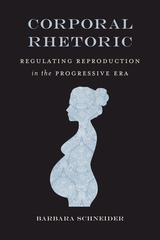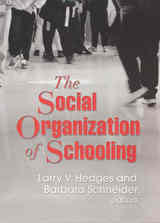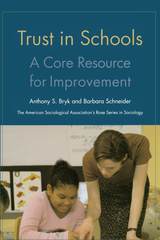4 books about Schneider, Barbara

The Adolescent Years
Social Influences and Educational Challenges
Edited by Kathryn Borman and Barbara Schneider
University of Chicago Press, 1998
This volume considers adolescence in broad terms, as a "dynamic of social construction." The contributors examine the changes in various social contexts in which teenagers live—family, school, community institutions, peer groups, workplace—and show how these factors can significantly affect the progress of social and cognitive developmental tasks.
[more]

Corporal Rhetoric
Regulating Reproduction in the Progressive Era
Barbara Schneider
University of Alabama Press, 2021
Examines public discourse from the Progressive Era over the state’s right to regulate women’s bodies and their reproduction
When Justice Oliver Wendell Holmes determined in 1927 that sterilization was a legitimate means of safeguarding the nation’s health, he was asserting the state’s right to regulate the production of the national body. His opinion represented a culmination of arguments about reproduction and immigration that had been circulating for years but that intensified during the Progressive Era. Arguments about reproductive and immigration practices surged to the foreground, and tectonic shifts in the conceptual schemes and practices of reproduction in the United States followed.
Drawing on feminist historiography and genre studies, Corporal Rhetoric: Regulating Reproduction in the Progressive Era explores the rhetoric of medical research, new technologies, and material practices that shifted the idea of childbirth as an act of God or Nature to a medical procedure enacted by male physicians on the bodies of women made passive by both drugs and discourse. Barbara Schneider considers how efficiency, the hallmark of scientific management, was raised to a cardinal virtue by its inclusions in the powerful mediums of presidential speeches, national educational policies, and eugenics discourse to reclassify babies, long regarded as gifts, as either valuable assets or defective products.
Schneider shows how the legal system drew upon medicine, scientific management, and the emerging discipline of sociology to restrict women’s labor in order to preserve reproductive capacity, categorized by Supreme Court opinions as a public good rather than a private capacity. Throughout, she ties the arguments developed during this era to current debates about mothering rhetorics, reproductive rights, immigration, and conceptions of the nation.
By weaving together medical research reports, clinical practices, case studies, legal opinions and legislative acts, and the epistemology of scientific management, Schneider illuminates the network that women such as Margaret Sanger, Jane Addams, Lillian Gilbreth and multiple others negotiated as they sought to give women room to exercise their reproductive capacity. Through her analysis of the machinery of these discourses and the material uptake of their genres in the daily practices of reproductive bodies, Schneider offers a provisional theory of corporal rhetoric that begins to answer the call for a new material theory of the body.
When Justice Oliver Wendell Holmes determined in 1927 that sterilization was a legitimate means of safeguarding the nation’s health, he was asserting the state’s right to regulate the production of the national body. His opinion represented a culmination of arguments about reproduction and immigration that had been circulating for years but that intensified during the Progressive Era. Arguments about reproductive and immigration practices surged to the foreground, and tectonic shifts in the conceptual schemes and practices of reproduction in the United States followed.
Drawing on feminist historiography and genre studies, Corporal Rhetoric: Regulating Reproduction in the Progressive Era explores the rhetoric of medical research, new technologies, and material practices that shifted the idea of childbirth as an act of God or Nature to a medical procedure enacted by male physicians on the bodies of women made passive by both drugs and discourse. Barbara Schneider considers how efficiency, the hallmark of scientific management, was raised to a cardinal virtue by its inclusions in the powerful mediums of presidential speeches, national educational policies, and eugenics discourse to reclassify babies, long regarded as gifts, as either valuable assets or defective products.
Schneider shows how the legal system drew upon medicine, scientific management, and the emerging discipline of sociology to restrict women’s labor in order to preserve reproductive capacity, categorized by Supreme Court opinions as a public good rather than a private capacity. Throughout, she ties the arguments developed during this era to current debates about mothering rhetorics, reproductive rights, immigration, and conceptions of the nation.
By weaving together medical research reports, clinical practices, case studies, legal opinions and legislative acts, and the epistemology of scientific management, Schneider illuminates the network that women such as Margaret Sanger, Jane Addams, Lillian Gilbreth and multiple others negotiated as they sought to give women room to exercise their reproductive capacity. Through her analysis of the machinery of these discourses and the material uptake of their genres in the daily practices of reproductive bodies, Schneider offers a provisional theory of corporal rhetoric that begins to answer the call for a new material theory of the body.
[more]

The Social Organization of Schooling
Larry V. Hedges
Russell Sage Foundation, 2005
Schools are complex social settings where students, teachers, administrators, and parents interact to shape a child's educational experience. Any effort to improve educational outcomes for America's children requires a dynamic understanding of the environments in which children learn. In The Social Organization of Schooling, editors Larry Hedges and Barbara Schneider assemble researchers from the fields of education, organizational theory, and sociology to provide a new framework for understanding and analyzing America's schools and the many challenges they face. The Social Organization of Schooling closely examines the varied components that make up a school's social environment. Contributors Adam Gamoran, Ramona Gunter, and Tona Williams focus on the social organization of teaching. Using intensive case studies, they show how positive professional relations among teachers contribute to greater collaboration, the dissemination of effective teaching practices, and ultimately, a better learning environment for children. Children learn more from better teachers, but those best equipped to teach often opt for professions with higher social stature, such as law or medicine. In his chapter, Robert Dreeben calls for the establishment of universal principles and practices to define good teaching, arguing that such standards are necessary to legitimize teaching as a high status profession. The Social Organization of Schooling also looks at how social norms in schools are shaped and reinforced by interactions among teachers and students. Sociologist Maureen Hallinan shows that students who are challenged intellectually and accepted socially are more likely to embrace school norms and accept responsibility for their own actions. Using classroom observations, surveys, and school records, Daniel McFarland finds that group-based classroom activities are effective tools in promoting both social and scholastic development in adolescents. The Social Organization of Schooling also addresses educational reforms and the way they affect a school's social structures. Examining how testing policies affect children's opportunities to learn, Chandra Muller and Kathryn Schiller find that policies which increased school accountability boosted student enrollment in math courses, reflecting a shift in the school culture towards higher standards. Employing a variety of analytical methods, The Social Organization of Schooling provides a sound understanding of the social mechanisms at work in our educational system. This important volume brings a fresh perspective to the many ongoing debates in education policy and is essential reading for anyone concerned with the future of America's children.
[more]

Trust in Schools
A Core Resource for Improvement
Anthony Bryk
Russell Sage Foundation, 2002
Most Americans agree on the necessity of education reform, but there is little consensus about how this goal might be achieved. The rhetoric of standards and vouchers has occupied center stage, polarizing public opinion and affording little room for reflection on the intangible conditions that make for good schools. Trust in Schools engages this debate with a compelling examination of the importance of social relationships in the successful implementation of school reform. Over the course of three years, Bryk and Schneider, together with a diverse team of other researchers and school practitioners, studied reform in twelve Chicago elementary schools. Each school was undergoing extensive reorganization in response to the Chicago School Reform Act of 1988, which called for greater involvement of parents and local community leaders in their neighborhood schools. Drawing on years longitudinal survey and achievement data, as well as in-depth interviews with principals, teachers, parents, and local community leaders, the authors develop a thorough account of how effective social relationships—which they term relational trust—can serve as a prime resource for school improvement. Using case studies of the network of relationships that make up the school community, Bryk and Schneider examine how the myriad social exchanges that make up daily life in a school community generate, or fail to generate, a successful educational environment. The personal dynamics among teachers, students, and their parents, for example, influence whether students regularly attend school and sustain their efforts in the difficult task of learning. In schools characterized by high relational trust, educators were more likely to experiment with new practices and work together with parents to advance improvements. As a result, these schools were also more likely to demonstrate marked gains in student learning. In contrast, schools with weak trust relations saw virtually no improvement in their reading or mathematics scores. Trust in Schools demonstrates convincingly that the quality of social relationships operating in and around schools is central to their functioning, and strongly predicts positive student outcomes. This book offer insights into how trust can be built and sustained in school communities, and identifies some features of public school systems that can impede such development. Bryk and Schneider show how a broad base of trust across a school community can provide a critical resource as education professional and parents embark on major school reforms. A Volume in the American Sociological Association's Rose Series in Sociology
[more]
READERS
Browse our collection.
PUBLISHERS
See BiblioVault's publisher services.
STUDENT SERVICES
Files for college accessibility offices.
UChicago Accessibility Resources
home | accessibility | search | about | contact us
BiblioVault ® 2001 - 2024
The University of Chicago Press









